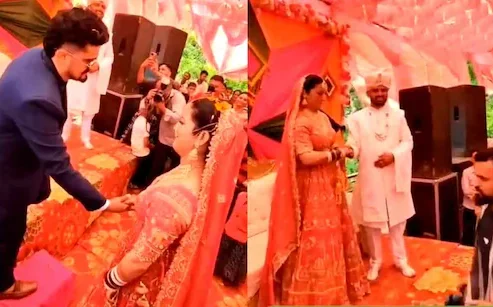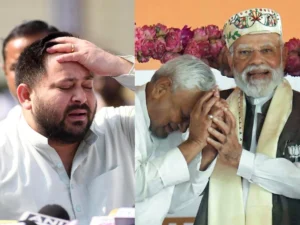Following the long-standing polyandry custom of the Hatti tribe in the state, a bride wedded two husbands in an extraordinary wedding that happened in Himachal Pradesh. Although many members of the community have moved on from this antiquated custom, these trio fully embraced and owned it.
In the Shillai hamlet of Himachal, the woman wedded two brothers in a ceremony. Otherwise it appeared to be an ordinary wedding. The three days of the event began on July 12. The three of them got married in front of hundreds of guests amid joyous local traditional music and dances. The grooms, Pradeep and Kapil, are from the state’s Shillai village, while the bride, Sunita, is from the Kunhat village in Himachal. All three of them are members of the Hatti tribe, where these kinds of unions have long been accepted and popular.
Sunita claims that she was aware of this custom. She took the choice to marry the two brothers on her own initiative. She went on to say that she appreciates the relationship the three of them have formed. While Kapil works overseas, the older brother, Pradeep, is employed by the state government.
Is This a Lawful Practice?
The Himachal Pradesh High Court has recognised and protected this tradition under “Jodidar Law.” It is allowing it to persist among tribal tribes even though polyandry is illegal in India. Leaders in the Hatti community view this custom as a crucial cultural indicator.

The Hattis, who inhabit about 450 villages in the Trans-Giri region, were designated as a Scheduled Tribe in part because to their distinctive tribal customs, such as Jodidaran. The Jodidara custom is still practiced in a few places, despite its demise due to modern ideals. Five polyandrous weddings have been solemnised by families in the Trans-Giri area of Himachal in the past six years. It is reserving the tradition in Sirmaur communities.
What is polyandry and why was it practiced by the Hatti tribe?
The Hatti group, a Scheduled Tribe, has a polyandry custom known as “Jodidara”. It is acknowledged by the tax laws of Himachal Pradesh. This custom is common in the tribal districts of Jaunsar Babar in Uttarakhand and Kinnaur in Himachal Pradesh. Locally, the unusual tribal marriage custom is referred to as “Jajda.” The “Seenj” ceremony is held at the groom’s home. Then the bride is brought to the groom’s village in a procession.
One of the primary reasons this custom developed was to prevent the division of the family land upon marriage. Although the ownership of ancestral property by tribal women is a controversial topic, polyandry is still practiced covertly in some places.
The Hatti community leader added that the Jajda ritual fosters understanding and camaraderie within a combined family. According to Kundan Singh Shastri, when two or more brothers including those who were born to separate mothers marry a single bride, understanding becomes deeper.
The general secretary highlighted that Jajda also aids in the management of dispersed agricultural areas and cited “security” as the third factor contributing to its prominence. Since remote farming grounds in rugged mountainous regions demand family care and cultivation over an extended period of time, economic necessities have translated into sociocultural norms.







Be First to Comment